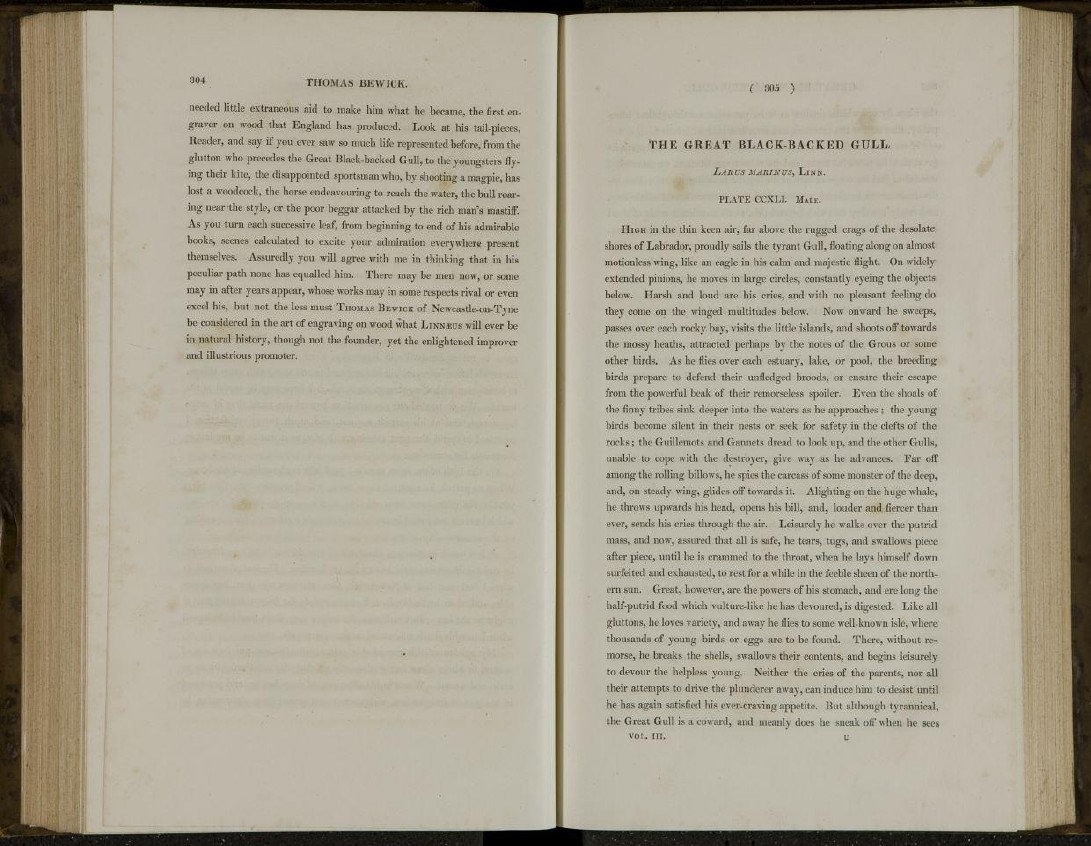
304 THOMAS BEWICK.
needed little extraneous aid to make him what he became, the first engraver
on wood that England has produced. Look at his tail-pieces,
Reader, and say if you ever saw so much life represented before, from the
glutton who precedes the Great Black-backed Gull, to the youngsters flying
their kite, the disappointed sportsman who, by shooting a magpie, has
lost a woodcock, the horse endeavouring to reach the water, the bull roaring
near the style, or the poor beggar attacked by the rich man's mastiff.
As you turn each successive leaf, from beginning to end of his admirable
books, scenes calculated to excite your admiration everywhere present
themselves. Assuredly you will agree with me in thinking that in his
peculiar path none has equalled him. There may be men now, or some
may in after years appear, whose works may in some respects rival or even
excel his, but not the less must THOMAS BEWICK of Newcastle-on-Tyne
be considered in the art of engraving on wood what LINNíEÜS will ever be
in natural history, though not the founder, yet the enlightened improver
and illustrious promoter.
(' 305 )
THE GREAT BLACK-BACKED GULL,
LAR US MARIN US, LlNN.
P L A T E C C X L I . MALE.
HIGH in the thin keen air, far above the rugged crags of the desolate
shores of Labrador, proudly sails the tyrant Gull, floating along on almost
motionless wing, like an eagle in his calm and majestic flight. On widely
extended pinions, he moves in large circles, constantly eyeing the objects
below. Harsh and loud are his cries, and with no pleasant feeling do
they come on the winged multitudes below. Now onward he sweeps,
passes over each rocky bay, visits the little islands, and shoots off towards
the mossy heaths, attracted perhaps by the notes of the Grous or some
other birds. As he flies over each estuary, lake, or pool, the breeding
birds prepare to defend their unfledged broods, or ensure their escape
from the powerful beak of their remorseless spoiler. Even the shoals of
the finny tribes sink deeper into the waters as he approaches ; the young
birds become silent in their nests or seek for safety in the clefts of the
rocks; the Guillemots and Gannets dread to look up, and the other Gulls,
unable to cope with the destroyer, give way as he advances. Far off
among the rolling billows, he spies the carcass of some monster of the deep,
and, on steady wing, glides off towards it. Alighting on the huge whale,
he throws upwards his head, opens his bill, and, louder and fiercer than
ever, sends his cries through the air. Leisurely he walks over the putrid
mass, and now, assured that all is safe, he tears, tugs, and swallows piece
after piece, until he is crammed to the throat, when he lays himself down
surfeited and exhausted, to rest for a while in the feeble sheen of the northern
sun. Great, however, are the powers of his stomach, and ere long the
half-putrid food which vulture-like he has devoured, is digested. Like all
gluttons, he loves variety, and away he flies to some well-known isle, where
thousands of young birds or eggs are to be found. There, without remorse,
he breaks the shells, swallows their contents, and begins leisurely
to devour the helpless young. Neither the cries of the parents, nor all
their attempts to drive the plunderer away, can induce him to desist until
he has again satisfied his ever-craving appetite. But although tyrannical,
the Great Gull is a coward, and meanly does he sneak off when he sees
VOL, III. U